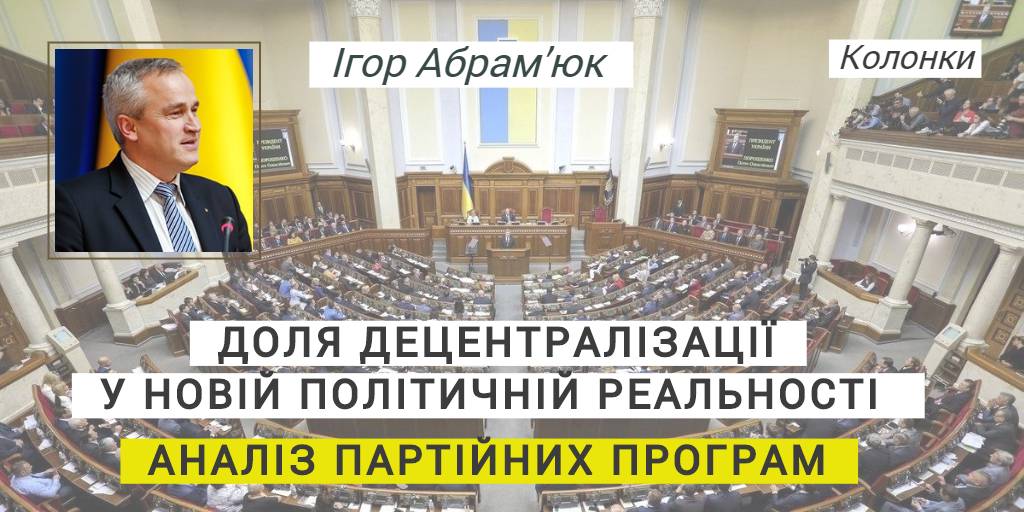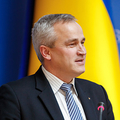Fate of decentralisation in the new political reality – analysis of political party programmes
By Ihor Abramyuk, local and regional development expert
An overview of the programmes of some of the leading political parties in terms of decentralisation, self-governement and territorial reforms
Political parties, that will soon determine the state policy, declare their intentions in party programmes.
I tried to analyse programme points of political parties regarding “Reform number 1”, which includes decentralisation, local self-government and territorial reforms. All considerations and conclusions are personal and do not claim objectivity.
“Servant of the People” party programme (Zelensky’s)
The programme of the new ruling party, which is currently the leader in all election ratings, contains a message on decentralisation already in the first paragraph:
- Cleared, renovated and responsible authorities
We will carry out decentralisation of power in accordance with the European norms: we will transfer the maximum of possible powers to executive committees of local councils, turn state administrations into European-type prefectures.
It is worthwhile to note that the programme uses the wording "we will carry out", "we will transfer", "transform", and not "continue", "complete". Therefore, in our opinion, there is a certain risk that the current reforms may be subject to revision.
“Holos” (“Voice”) party programme (Vakarchuk’s)
The programme of the new party that is gaining popularity contains somewhat expanded point on decentralisation in the penultimate section "New approaches to policy and governance" (page 20 of the 26-page programme text):
We will give more authority and resources to the ground. We will enshrine decentralisation and the new territorial structure in the Constitution.
We move decision-making as closely as possible to those directly concerned. At the same time, we will maximally contribute to the further formation and development of amalgamated hromadas.
We will create conditions for attracting qualified staff and effective local management. Effective local government work is important for people's daily lives.
In general, it should be said that the party's programme provisions on decentralisation are rather specified and professional.
Programme of the European Solidarity party (Poroshenko’s)
The old party programme (2015) is still published on the official party website. Actually, the whole website has not yet been updated – it is still the website of the BPP "Solidarity". The programme objectives include the task of "Strong Hromadas", which declares the intention to implement reforms:
- Strong hromadas.
- The result of the administrative-territorial reform should be the transfer of power to the hromada level, reforming and optimisation of the country’s administrative division.
- Creation of strong self-governing hromadas will bring state administration closer to European standards.
Obviously, decentralisation will be "on the flag" of the party in this campaign.
Programme of the "Ukrainian Strategy" party (Groysman’s)
The programme of the current Prime Minister Volodymyr Groysman puts decentralisation, as one would expect, on a prominent place. It is absolutely natural, since it is Mr Groysman who as a former Deputy Prime Minister, then as the Chairman of the Verkhovna Rada, and – most importantly – as the Prime Minister, initiated, launched the reform and consistently ensured its implementation. Therefore, it certainly does not make sense to refuse from the most successful and important public reform, which he quite rightly can consider to be “his own”:
- Equal rights and democratic governance;
- Comfortable city and village.
One might want to see a direct mention of the need to amend the Constitution in the programme, but this is a brief version of the programme, and therefore the full version may cover this issue as well.
"Civic Position" party (Hrytsenko’s)
The party programme contains a number of provisions that deal with decentralisation and self-government.
The key to building a successful state, a regional leader, is the compliance of public and state mechanisms with the civilizational identity of our citizens.
The party recognises that Ukraine has deep historical traditions of self-government and that it is on this ground that a strong state should be built.
Within the framework of the programme, decentralisation is the first of the three key principles.
The programme is distinguished by its integrity and a fairly high level of formulations.
“Batkivshchyna” (“Homeland”) party (Tymoshenko’s)
The official website of the party for some reason still has a 2014 programme, in which (see section 6 "Victory of Unity") there are provisions on the top priority of self-government reform, voluntaryamalgamation of hromadas. Interestingly, Section 7 "Victory of the Ukrainian Village" contains the ideas that the party will not allow the adoption of the administrative-territorial reform that destroys the village, proposed by the current government."
Apparently, the most well-known party message that "the village is dying" was based on this programme point.
The election programme of Yulia Tymoshenko as a presidential candidate is posted on her personal website.
"Power and Honour" party (Smeshko’s)
The party’s website has a "Party Programme" heading that features not a party programme, but the election programme of the presidential candidate Ihor Smeshko, that has rather comprehensive ideas on decentralisation, territorial reform, transparency and accountability of local self-government bodies.
"Opposition Platform for Life" party (Boyko's)
There is no election programme on the party website. There is a separate section “Ideological Foundations” that tells about a strong economy, “just and effective social state”, but there is nothing about self-government.
The website also features the election programme of presidential candidate Yuriy Boyko, which contains, in particular, the following points:
State servicing people
We will increase the powers of local authorities. We will ensure the transition to direct elections of leaders in the regions.
We will ensure the economic independence of the regions to strengthen Ukrainian statehood.
The approach to building local budgets will be reviewed. Territorial hromadas will receive more financial resources for daily needs and development.
“Opposition Bloc” party (Vilkul’s)
There is no party programme on its official website yet. There is only some information from the party congress that states "the main points of the party’s election programme", among which:
If we try to interpret these programme provisions, it can be entirely reasonable to assume that decentralisation may be among the reforms they promise to cancel.
It is worth noting that analysis of party programmes in no way allows us to draw conclusions about the real policy of the mentioned political forces. In Ukraine, it is not a good tradition to do absolutely adverse to what is declared – practical political steps can differ significantly from programme postulates.
To have a full picture, one should also look at the electoral lists and carefully analyse who of the candidates (there are many new and completely unknown people among them) understands the subject and is able to implement the relevant programme provisions. But this is the subject of a separate study, which is definitely being already done by someone.
* Selection of parties for programme analysis is done by the author at his own discretion,
primarily on the basis of information on their ratings and given the influence of individual politicians on the current course and prospects of the reform
The full version is available in Ukrainian – please click HERE

06 February 2026
Акселераційна програма Clusters4Regions: новий етап розвитку кластерного менеджменту в Україні
Акселераційна програма Clusters4Regions: новий...
2 лютого розпочала роботу Школа кластерного менеджменту #Clusters4Regions — акселераційна навчальна програма...
06 February 2026
Анонс: як Україна адаптує місцеве самоврядування до стандартів ЄС — підсумки проєкту ЦППР
Анонс: як Україна адаптує місцеве...
Система місцевого самоврядування та територіальної організації влади в Україні зіштовхується з викликами воєнного...
05 February 2026
Міжнародні програми підтримки громад: гід можливостей для відновлення та розвитку
Міжнародні програми підтримки громад: гід...
Matchmaking сесія під час Impact.Zhytomyr 2.0 Forum Автори: Ярослав Жидик, асоційований партнер...
05 February 2026
Час на якість: що дає громадам відтермінування містобудівних дедлайнів
Час на якість: що дає громадам відтермінування...
У попередніх матеріалах ми говорили про «страх підпису» у відбудовчих проєктах — явище, з яким сьогодні стикаються...
